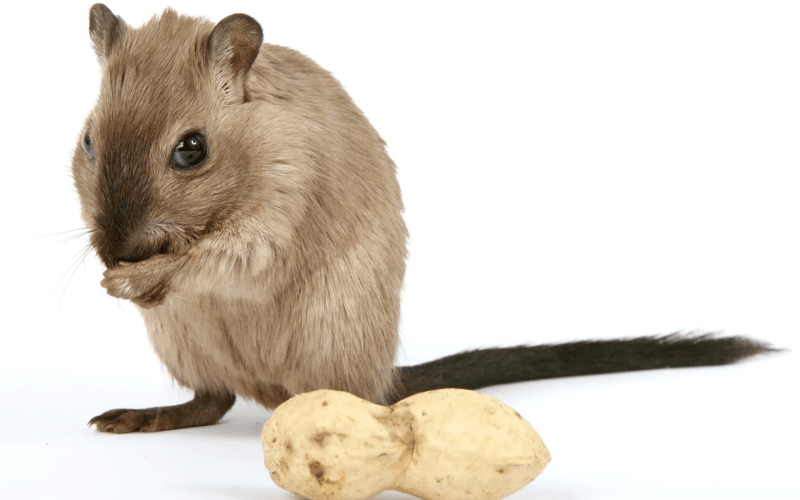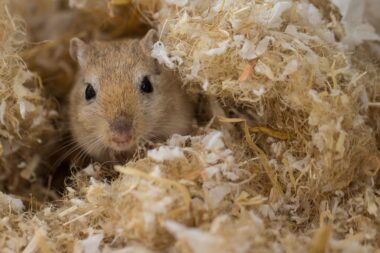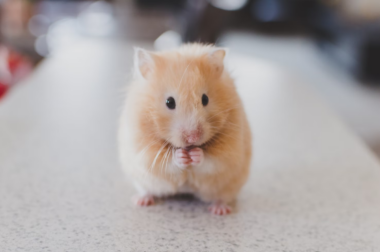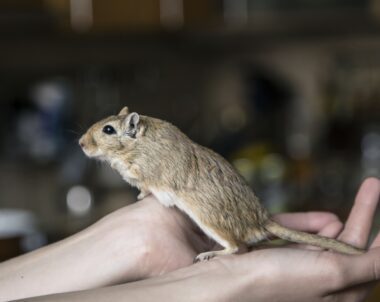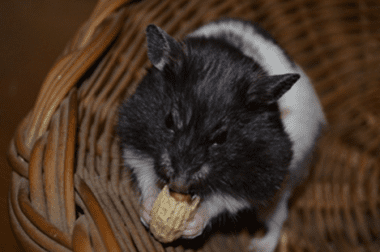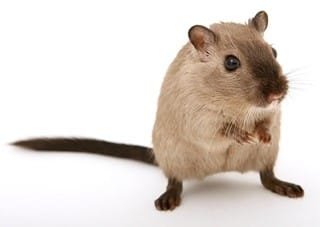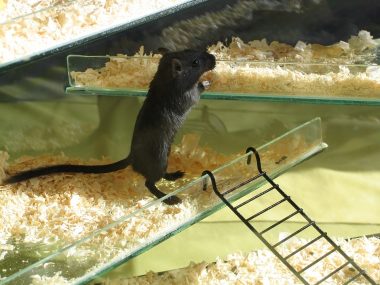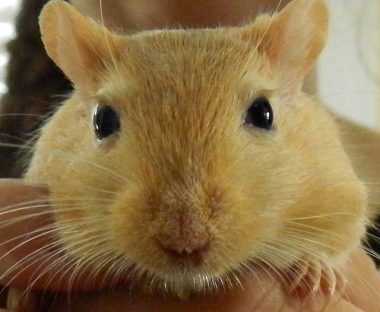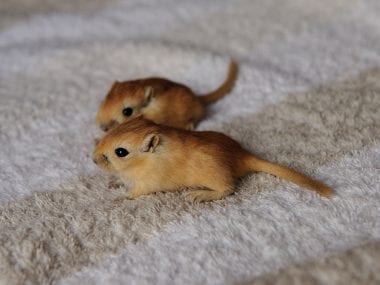Gerbils were once called ‘desert rats’. After being introduced to Europe and North America as pets, they were called ‘gerbils’. Although gerbils belong to the rodent family, they are distinct from rats. They are socially active creatures who build extensive underground burrows and tunnels. Gerbils spend most of their time in these below-ground caves, only leaving when they need water and food.
Even though they originate from the desert, the gerbil’s entire body is covered in fur. It protects them from sunburns in arid regions. Gerbils are curious, calm, and inquisitive. They do not get startled very easily. If a gerbil senses danger, it lets out a squeal and thumps its hind legs to warn others. Gerbils make great first-time pets for children.
To ensure your companion lives a long and healthy life, the right gerbil diet is essential.
Commercial food
Whatever commercial gerbil food brand you might choose, should meet certain requirements so that your gerbils have the necessary nutrients. Veterinarians recommend a mixture that contains 14 percent protein. Any food with less than the recommended account needs supplementation. You will have to offer other protein sources like insects. If you’re not sure how protein your pet needs, speak to the vet.
Lab and pellet blocks are a major food source in the gerbil diet. These are nutritionally balanced. The pellets are small while the lab blocks are bigger food chunks that look like tiny biscuits. Both pellets and lab blocks are excellent options because significant scientific research is behind their composition. Compared to loose mixtures, gerbils cannot select anything out. With every bite, your pet gets a balanced food intake. However, like all creatures, your gerbil has a flair for variety as well. Commercial food might be enriching, but it can get boring very quickly. It makes an excellent basic diet. For variety, consider seeds and treats.
Seed Mixtures
Seed mixes are loose mixtures of varieties of seeds such as pumpkin and sesame. Although seed mixes are an excellent source of protein, they are also very high in fat. Ensure the seed mixture has a fat content between six and eight percent. Some seed mixes contain dried fruits and vegetables. However, your pet might pick these out and leave out the rest, leading to a dietary imbalance. This will prevent your gerbil from putting on excess weight. Sunflower seeds in particular are a gerbil’s favorite food. When the seed mixture is offered, your gerbil might select these out. You might consider replacing the sunflower seeds with pumpkin seeds-a healthier option for weight management. Avoid offering loose seed mixes alone to your pet gerbil. Use this in your gerbil diet as a treat.
Diet Supplements
These are nutritious foods but should be given in moderation. Diet supplements are added alongside commercial food mixes. On occasion, you may add the following extra foods to your gerbil diet:
Vegetables/grains
- Dry pasta (one or two pieces only)
- Carrots
- Peas
- Kale
- Broccoli
- Spinach
- Dandelion greens
- Beet greens
- Timothy hay
- Boiled sweet potatoes
- Romaine lettuce
- Corn (Gerbils love it, but doesn’t offer much nutrition)
- Regular oats
- Millets
Fruits (bite-size amounts only)
- Apples
- Pears
- Strawberries
- Blueberries
- Oranges
Extra protein
- Waxworms
- Mealworms
- Crickets
- Scrambled or boiled eggs
The foods mentioned on this list are safe to give your pet gerbil. However, do offer them in moderate amounts. Do not use them as a meal replacement. When eaten in excess quantities, these foods may cause diarrhea, digestive troubles, and diabetes. If you plan to offer vegetables and fruits, begin with small amounts. Your pet may eat everything offered very quickly which can cause tummy troubles. Before offering any fruits and vegetables, ensure they are pesticide-free and thoroughly washed.
Foods to avoid in the gerbil diet
Like other animals, there are certain foods that your pet gerbil cannot process very well. Never give the following foods to your pet gerbil as they may cause toxicity:
- Raw potatoes
- Potato leaves
- Rhubarb leaves
- Raw kidney beans and other types of beans
- Chocolate
- Citrus fruits
Gerbil diet treats
Treats are a great way to include a variety in your pet’s diet. They can also be used as rewards during training. Pet gerbils will jump at the chance of getting the following treats:
- Seeds like pumpkin and sunflower. Offer these sparingly because they have high-fat content.
- Nuts are also delicious but give it rarely because they’re also high in fat.
- Unsweetened breakfast cereals
- Toasted or plain whole-grain bread
- Currants and raisins
- Small pieces of cheese
- Small dog biscuits (no meat) to keep their teeth chiseled
Your pet gerbil is a natural hoarder who won’t think twice about hiding his/her treats for later. They will bury their food in little burrows and corners of the cage. After a few hours of stashing it, they will forget where they hid it. The food will start to rot and become unhealthy for the gerbil. As a habit, spot clean your pet’s living area to remove stored food before it becomes harmful for your gerbil.
What food is best in a gerbil diet?
Feeding your pet a variety of foods will overcome nutritional deficiencies. A lab block or pelleted diet can be the basis of your companion’s diet. Treats, loose seeds, and diet supplements can add variety and interest. Ensure your gerbil is eating the lab or pellet block to acquire those nutritional advantages before offering treats or seeds. Keep in mind that sunflower seeds have a high-fat content. Use it sparingly. Reserve it for training and taming your gerbil.
Do gerbils require water?
Since gerbils originate from Mongolia where the climate is dry, they don’t need much water. However, do not assume water is not required or important. Always provide your gerbil with clean and fresh water through a sipper bottle. This comes equipped with the cage or may be purchased separately.
Your pet needs constant access to clean water. It should be offered through an upright drinking bottle with an attached metal tube (resembles a straw). Change the water daily. Don’t forget to clean the drinking tube and water bottle before refilling it with fresh water. Avoid filling the bottle with tap water. Always opt for chlorine-free water. Your tap water may not be treated adequately and contain heavy metals or chlorine. Use water from a filtration system or bottled water.
Gerbil feeding routine
Similar to other pets, your companion must have a fixed feeding routine. Lab blocks and pellets have specific instructions on when to feed your pet and how much to offer them. Gerbils should be fed once a day. If this is not enough, your pet will let you know that they’re hungry by clawing and digging into their cage in search of food. This is a natural behavior for gerbils. These tiny creatures enjoy hunting and foraging for their meals. Instead of serving their food in a dish, sprinkle the pellets directly on the cage floor. If you are unsure, speak to a vet. Let your pet enjoy searching for its food. This will keep it engaged and expose it to eating a variety of foods. The added benefit is your pet will get more nutrients to be healthy.
How to feed your pet gerbil?
Use a dish or small bowl made of ceramic materials to feed your pet. Avoid using plastic or melamine containers as they can easily chew on them. Place the pelleted dish or lab blocks in the ceramic dish. Add a light sprinkling of seeds (not more than a teaspoon) into the dish. Place this in a clean area of the cage. Over time, you will understand how much food your gerbil needs and eats. Your clue is how much they finish within 24 hours. If there is leftover food the next day, remove it. Avoid mixing it with fresh food. Always offer fresh food to your gerbil.
Treats and supplements should be offered in a separate bowl. Remove this bowl after a few hours even there is uneaten food in it. This prevents spoilage.
If you are comfortable feeding your gerbil by hand, then consider offering it treats this way. It’s an excellent way to gain your pet’s trust. Hand feeding will help you train and tame your pet gerbil.
Stick to the same meal time every day. Most gerbils like to eat in the evenings.
Gnawing and chewing
Your pet gerbil is an energetic little guy/gal. It needs constant engagement and opportunities to gnaw. This habit helps keep its teeth filed (their teeth are constantly growing). Without any opportunities for chewing or gnawing, your gerbil’s teeth will grow too much and cause a lot of pain. Eventually, your pet will stop eating. Place several biting and chewing opportunities in your pet’s habitat. Some excellent examples are:
- Paper (after shredding, it will become a part of the gerbil’s substrate)
- Coconut shells
- Banana leaves
- Hay
- Untreated softwood
Conclusion
Gerbils are omnivores. Although much of the gerbil diet consists of fruits, vegetables, and seeds, they do occasionally enjoy and benefit from non-vegetarian protein options such as mealworms. Commercial gerbil food is nutritionally balanced and should form the base of your pet’s diet. You may supplement it with treats and seeds. Before offering your pet anything apart from conventional food, consult the vet.
